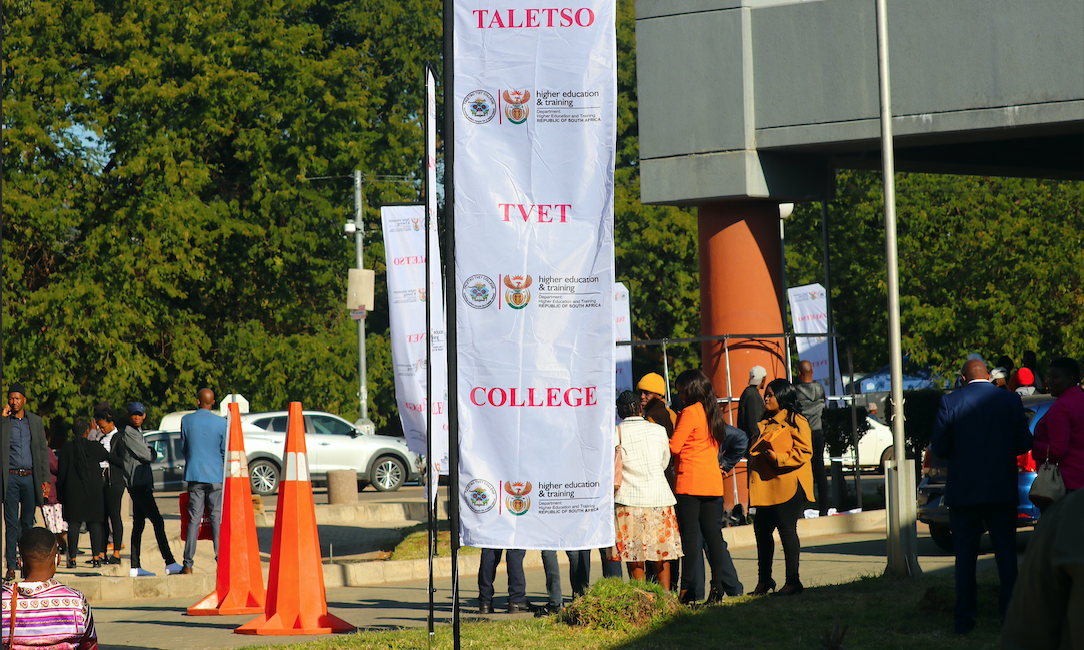DHET member and official, Ms Nozipho Khumalo (Pictured on the right) urged that SRC leaders should not be putting their issues in front but those of the students first. They took an oath to represent each student in all aspects of their academic and college social issues.
The Department of Higher Education and Training has developed the National Guideline for Academic Support for TVET Colleges, this document was drafted to assist colleges and students to design suitable programmes to improve student academic support.
The government has invested in the TVET sector in the effort to provide access to previously excluded but in its efforts, students must academically perform.
All 50 TVET Colleges should create conducive environments for teaching and learning. Student academic support is also the responsibility of student leaders. Academic support’s purpose is to improve underperforming students and also ensure students are equipped with study skills and motivated to pass their studies.
The academic requirements of being a student leader are 7/7 subjects in NCV and 4/4 subjects in NATED. This requirement is ensuring that student leaders should be examples and also show that they are responsible for their learning process. Student leaders must take control of their learning by using time management and study skills. Ensure they create study timetables, communicate with their lecturers and also attend peer tutoring sessions. They must also assist the campus and college to develop student-centred and informative academic support interventions.
The Taletso TVET College SRC watched a video on what is a school system “Everybody is a genius. But if you judge a fish by its ability to climb a tree, it will live its whole life believing that it is stupid.” Ms Khumalo shared that this quote is frequently attributed to Einstein. She engaged with the audience by asking them what they have heard and learnt from the video. She then shared the effects and effects of education in the present and future world, what is the role and expectations of students and institutions in the future, or has the system changed or has remained stagnated. The need for change to accommodate all students and be ready for the future world or world of work. Education’s purpose is to change the lives and skills of an individual and a country. The use of technology and innovation must be encouraged. She reminded students that they are an important catalyst in their learning by sharing their needs, and new ideas to promote student motivation, innovation and social inclusion in the college or the classroom.
Leadership appointed seats in Academic boards or any key positions their voices must be heard and advocate for better teaching and learning environments such as PQM that reflects the economy, resourced workshops and simulations rooms, assistive devices and textbooks or research resources. To also participate in improving curriculums, influence modern teaching and learning and take control of their learning. They were reminded they are students first and of the importance of their education and to graduate.
The student leaders in the workshop were challenged to critique and look at more models in learning styles. To understand that students are different or some may have learning barriers or disabilities which hinder learning and how to assist in identifying their academic challenges. As students on campuses, they should have knowledge on which programmes are available and which interventions, such as examination analysis, which subjects are high or low performing, which levels or programmes are low performing or improving or need attention, classroom referral systems, self-study, peer tutoring, use of Learner Management Systems, examination preparation and study skills etc. Student leadership to develop academic support programmes of actions on how they will assist in improving the student body’s academic performance.
Ms Khumalo reiterated that All students who registered in an academic year should progress to the next level of study and exit in record time.

